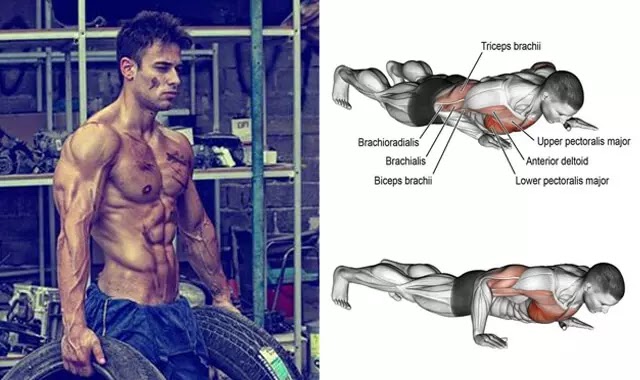Throughout the confinement imposed following the Covid-19 health crisis, we offered you training sessions at home without equipment with a list of exercises to be performed at body weight as well as complete sessions by group muscular. If you have followed our recommendations you must have noticed that although home training requires a minimum of imagination, it is quite possible to train without equipment. If you haven't tried the experiment, it is legitimate for you to ask yourself this question: can you gain muscle without equipment?
Not everyone is willing to be locked up for long hours in the weight room, or they simply cannot afford a gym membership. Either way, training without equipment has many followers, and the success of the Lafay Method or street workout programs are undeniable.
Bodybuilding without specific equipment is within the reach of all and all budgets and brings more than satisfactory results.
Bodyweight training
Most bodybuilders have practiced in their bedroom or on a bodyweight fitness trail. All the muscles of the body can be called upon through movements such as:
Pull-ups for the back muscles
Push-ups for pectorals
Lunges for legs and glutes
The balancing press on the hands for the shoulders
When training at home, it is possible to do dips between two chairs, curls or side raises with water bottles.
Resistance Bands
Resistance Band training is already training with equipment, but inexpensive and infinitely adaptable. They can be attached to a door, cabinet, ceiling light and do hundreds of different exercises at home or outdoors. The same is true with the suspension straps of the TRX type, with which you can work on your body weight and increase the difficulty by changing the angle of inclination.
How to gain muscle without equipment?
Gaining muscle without equipment requires more programming than when training with bars and dumbbells.
Also, regularity is essential, both in training, diet, and supplementation. To make constant progress in body weight, you have to constantly think about new exercises and especially be interested in biomechanics to exploit all the possibilities of this type of training.
Schedule Your Sessions and Be Regular
The # 1 rule of training without hardware is programming. Don't go into a session at home or outdoors without knowing what your workout will be like. You risk doing too much, or not enough, and most importantly, stagnating more quickly. Progress without planning is difficult in traditional weight training, and impossible in bodyweight training.
Also, be regular. Do at least 4 sessions per week, where groups will be called upon at a frequency established in advance:
Monday: Chest - Triceps
Tuesday: Dorsal - Biceps
Wednesday: active recovery: stretching
Thursday: Shoulders - Hamstrings
Friday: Quadriceps - Calves
Change Your Program Regularly
To progress and in this case, to gain muscle mass, the principle of progressive overload is a constant that must be kept in mind. Muscle grows in the face of stress but adapts quickly to it. This is why it is recommended to change your training program approximately every 6 to 8 weeks, to put a new strain on the muscles, which will have to adapt to it by hypertrophying.
To help you see more clearly, here is how to cycle your workouts:
Per muscle group Cycle 1: 12 sets of 20 reps with 30 seconds of rest
Cycle 2: 14 sets of 12 reps with added technique, with 1 min rest
Cycle 3: 16 sets of 10 reps with one technique, and 30 seconds of rest
Cycle 4: 12 sets of 30 reps with 1-minute rest
By keeping a stable plan over a certain period and modifying it to start again on a new cycle, you apply the principle of progressive overload: the muscle is subjected to a new, more important stress, which forces it to adapt and get fat.
Take Care of Your Diet
They say abs are forged in the kitchen, but every muscle is. Without targeted nutrition, your results are likely to be disappointing. As with training, plan a diet based on your muscle building or lean goals.
Favor proteins
Consume low glycemic index carbohydrates
Choose the best vegetable oils (olive, rapeseed, walnut, hazelnut, etc.)
Eat every 4 hours
Don't snack between meals
Drink at least 3 liters of water per day
Bet on good supplementation
Bodyweight training without equipment requires the same food intake as traditional bodybuilding. Supplementation is therefore recommended, but not just any. To gain muscle without material, opt for dietary supplements that promote hypertrophy and recovery. Because, without appearing to be, weight training without equipment is particularly exhausting.
Whey
Whey protein is the priority dietary supplement for bodybuilders, whether they train indoors or without equipment. It fuels muscles like no other source of protein and activates muscle anabolism more effectively. Its effectiveness is due to its extreme digestibility as well as its exceptionally high BCAA content.
BCAAs
BCAAs are branched amino acids that stop catabolism and trigger protein synthesis. They are taken before and after each training session. Broadly speaking, BCAAs:
Stop catabolism and ensure complete muscle recovery
Provide protein synthesis for better muscle development
Improve energy efficiency by preserving glycogen stores
Promote lean muscle gain
Training Boosters
Training boosters are complete formulas that promote and improve muscle building. Taken before a bodyweight or rubber band bodybuilding session, they make it possible to:
Mobilize more energy
Better recover between sessions
Stay focused longer
To feel better congestion
Develop muscles more effectively






.jpg)


0 Comments